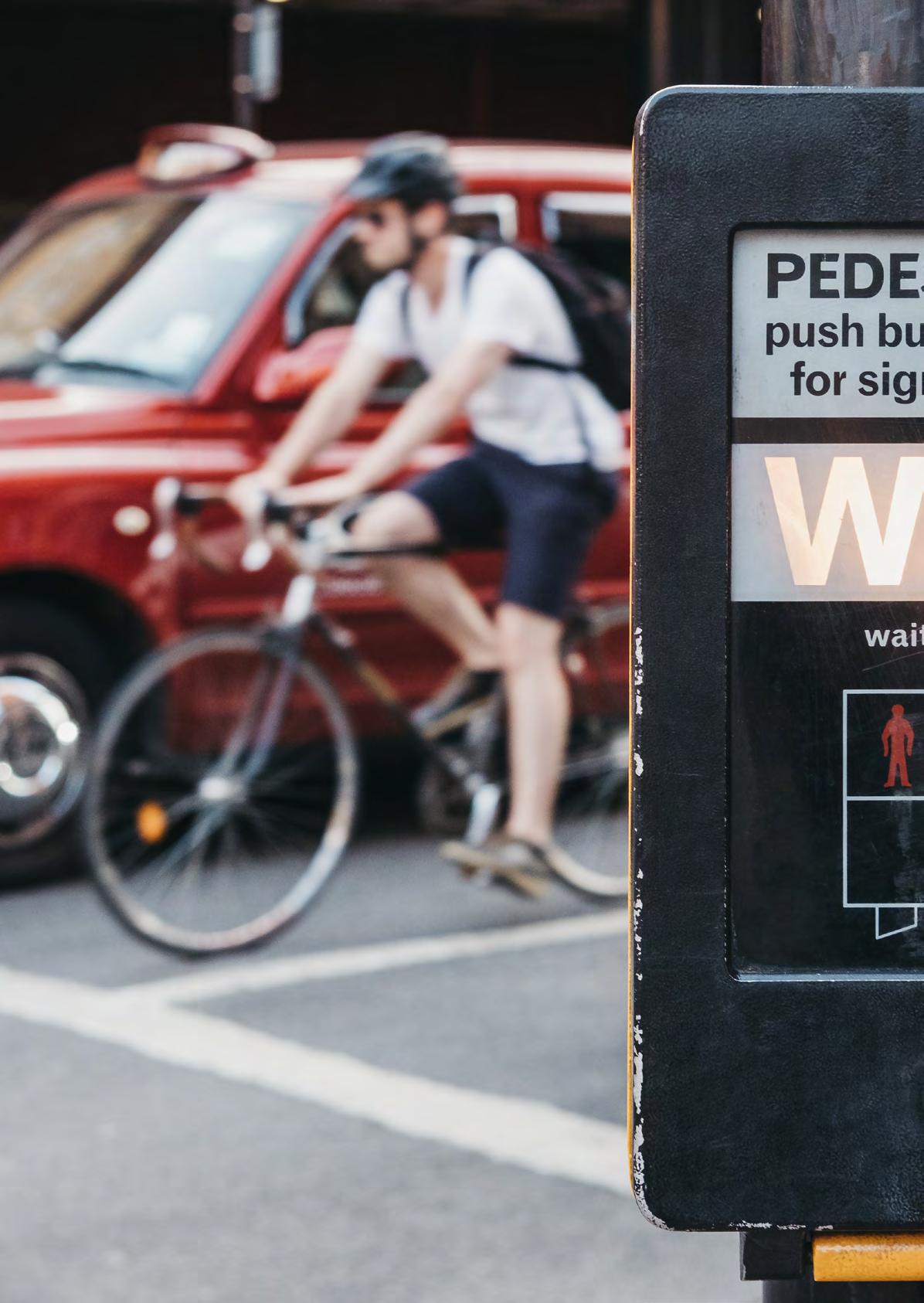

Introduction
The Road Safety Trust is dedicated to achieving zero road deaths and serious injuries on UK roads.
To achieve this, The Road Safety Trust (RST) provides funding for practical measures, research, dissemination, and education.
We are pleased to have provided your organisation with funding and want to ensure that the knowledge, understanding, tools and resources produced can be accessed, understood and used by the wider road safety community. This toolkit will help you increase the reach and influence of your work by facilitating the uptake and translation of this information into road safety practice and/or policy.
This toolkit will help you engage policy, practice and public audiences with your findings by:
• Clearly identifying the aims of your project
• Understanding how to plan your communications activities to support your project aims
• Identifying what outputs, learning and resources you will share and promote
• Targeting those who need to know about the findings of your work/project
• Focusing your communications where they can have the most impact
• Tailoring your findings to engage different audiences and leverage different channels
• Evaluating the success of your efforts
• Producing a Final Project Report, which is a public document published on our website that summarises your project’s aims, objectives, activities, findings and recommendations (this is in addition to project specific outputs such as tools, resources or a website and is separate from the Project Progress Report, which is an update on project management and spending that you submit to RST). All RST projects must produce a Final Project Report.
¤ In addition, the Grants Team will collaborate with you to determine if your project needs to produce a practitioner focused Project Briefing Depending on the focus of your project, this will either be a Policy, Evidence or Practitioner Briefing. This will be agreed with the Grants Team when your grant award is finalised.
1 Communications flow chart for grantees
Phase one: announcing the award
For each grant round, the Road Safety Trust will produce one collective press release to announce the projects which have received funding.
For this, grantees are required to provide a named project lead and contact details, to be a point of contact should there be any further interest from the media on specific projects. Grantees will also be asked to share contact details from their organisation’s press/ marketing department, if applicable.
This press release will be issued under embargo on a set advance date, which will be communicated to grantees. Signed paperwork should be completed prior to publication. Where it remains incomplete, this will be specified within the press release.
This date will also act as an embargo for grantees who wish to produce their own communications related to the award of grant funding after the RST announcement. This could include:
• A localised press release (for which the RST can provide editorial support if required)
• Blog post
• Social media
Press releases and blog posts must be approved by The Road Safety Trust, who may wish to provide a supportive quote.
The Road Safety Trust also has a boiler plate, which should be included at the foot of any press releases (see page 14).
When posting on X (formerly Twitter) or LinkedIn, it is requested that grantees tag The Road Safety Trust’s social media accounts:
• X: @TheRSTrust
• LinkedIn: The Road Safety Trust
This requirement continues for any social media content posted throughout the project and beyond completion.
Phase two: the Knowledge Sharing Template
As most projects reach their half-way point, The Road Safety Trust Grants Team will request that grantees complete a Knowledge Sharing Template (see page 9) using this guidance document for support.
The Knowledge Sharing Template asks grantees to consider how they plan to disseminate their findings at the culmination of the project. It includes, but is not limited to a press release, journal article, presenting at conferences etc.
The Template will help grantees engage policy, practice and public audiences. To support grantees in this process, The Road Safety Trust has produced the following resources:
• The Road Safety Trust impact framework (see page 6)
• Roadmap to Knowledge Sharing (see page 8)
Phase three: preparing for the end of the project
Circa 4-6 weeks before each project is due to complete, The Road Safety Trust’s communications department will be in contact with grantees to discuss their communications strategy, including a review of the plans laid out in the previously completed Knowledge Sharing Template. Any updates to the template should be shared both with the grants team and with RST communications at media@roadsafetytrust.org.uk.
The Road Safety Trust will seek to ascertain how grantees will fulfil these plans and offer support and guidance where needed.
At this stage, project briefings will also be considered.
4 Phase four: delivering communications
Once the project has finished, grantees will work alongside The Road Safety Trust to deliver the strategy set out in phase three.
Depending on the project, key milestones could include:
• Uploading the final project report to The Road Safety Trust website
• Uploading the report to other locations, such as the grantee website and/or the Road Safety Knowledge Centre
• Distribution of press release
• Production of blog post
• Social media posts
As per phase one, press releases and blog posts must be approved by The Road Safety Trust, who may wish to provide a supportive quote. Other resources created as part of projects, such as websites, documents and booklets must also be approved. These resources must be clearly branded with The Road Safety Trust logo.
The Road Safety Trust Impact Framework
The Road Safety Trust’s Theory of Change highlights our commitment to the practical application of project findings.
To make
• Safer Speeds • Safer Roads
• Safer Vehicles • Safer People
• Improved Post-Crash Response
• Improved Road Safety Management
• Better road safety knowledge & behaviour
• Better organisational risk management
• Better organisational policies & procedures
• Better guidance
• Better safety equipment design standards
• Better compliance
• Better road safety legislation
• Reports
• Evidence • Conferences/events
• Resources e.g. toolkits, compendium, podcast, video, training material, website
• Standards • Practical interventions
• Research & Development
• Partnerships • Communication
• Monitoring & Evaluation
• Leadership
• Standards & legislation
• Enforcement • Innovation
The RST uses an adapted Safe System Framework to categorise projects (safe system pillars) and to understand how each project will have an impact on the system (change mechanisms). This, in turn, helps us understand the impact we have in achieving our charitable purpose. The framework also highlights the areas where more work is needed.
Safer Vehicles
Safer Speeds
Safer Roads
Safer People
To have zero deaths and serious injuries on UK roads
Roadmap for Knowledge Sharing
Use the prompts below to help you complete the Knowledge Sharing Template. A blank template has been provided on the website.
• What is the primary aim of the project?
Project Aims
Communication Aims
• What are the secondary aims?
• Are these Specific, Measurable, Achievable?
• How can your communications help the project achieve its aims?
• What outputs, learning and resources do you plan to share and promote?
• What do you want people to know about your project?
• What do you want to change?
• Why does this need promoting?
Audience
Approach/ Communication Activities
• Who will use this knowledge?
• Who else could benefit from this knowledge?
• What channels will you use?
• What events will you leverage to promote and share outputs, resources or learning?
• What form will these be shared in? Press release, blogs, conferences, social media, newsletters etc.
• What format will communication outputs take? Video, graphics, reports, presentations.
• When is the best time to share your results? Dissemination can continue through the project lifecycle.
Resources
• People, finances, materials?
• Who will be responsible?
• What additional support do you need to activate your approach?
• Have you budgeted for these activities?
Evaluation
• What does success look like for your plan?
• How will you evaluate the reach or usage of what you share?
Long term plans*
• How will knowledge sharing continue into the future?
• Will individuals and groups be aware of the project in six months’ time? A year?
• How will project partners archive information for the future?
• Who will be responsible for sharing the knowledge in the future?
*These might be beyond the scope of the current grant but will influence the knowledge sharing plan.
Example of a completed template
A blank version of the template is provided on the website for grantees to complete
PROJECT DETAILS
Date: Project kick off date
Project Title: School Streets
Organisation: Road Safety Partners
Knowledge Sharing Lead: Partner 1
PROJECT AIMS
• Develop interventions to improve road safety around schools
• Provide schools with road safety education sessions
• Evaluate the effectiveness of the interventions
COMMUNICATION AIMS
Encourage schools and road safety practitioners to implement road safety measures in and around schools
Clarify that school street interventions do not displace road safety problems to adjacent streets
KNOWLEDGE SHARING AND EXCHANGE PLAN
Post Blog on Road Safety Partners website
Host Project Briefing on website
Road safety professionals
Director of Insight to draft
Sep prep
Live Start in Oct
Road safety professionals, school staff
Marketing Officer
Content and User
Experience Officer
Sep prep
Live Start in Oct
Google Analytics will show how many people have opened page
Google Analytics will show how many people have opened page and downloaded the document
Workshop at RSGB conference
Road Safety Professionals
Press release in RSGB Weekly round up
Host project reports on RST website and RSGB Knowledge Centre
Handbook guidance for schools
Road safety professionals, school staff and parents
Primary Researcher, Marketing Officer
Media links
School street event – case studies
Road safety professionals, school staff, road safety researchers
Headteachers and school teachers
Input and review by education professionals
LONG TERM PLAN
Road safety professionals, school staff and community, Local education authority
Sponsorship, venue, event organisers
November Attendees at workshop Networking opportunities
Start Nov - ongoing News outlets and news reports featuring the project and outputs
June
June
The number of visits to page in the Knowledge Centre
Schools utilising the concepts and delivering road safety messages or activities
Peer-reviewed journal article*
Road safety researchers
Publication costs
One year after launch of Handbook
An evaluation survey following the event
Prep June, submit Nov Online mentions, citations
*Not all projects will result in one of these but research based large grants are encouraged to produce at least one peer-reviewed journal article
Key tips/Checklist
Communication about your project and sharing the knowledge generated should be considered from the beginning. Planning how the research and/or practical resource will be shared can help guide the project and maintain focus on the project’s ultimate goal. Depending on the nature of the project, some information may be communicated before the entire project is completed.
Recognise that developing a communication strategy is an ongoing process. You are likely to start with broad objectives. As the project progresses and you work through the detail of your communications strategy, you will be able to be more specific about audiences or targets you wish to meet, etc.
Be realistic about what can be achieved. Some examples in a road safety context include:
• Increase knowledge and awareness of a road safety issue, problem or solution
• Increase awareness and implementation of an effective intervention
• Influence perceptions, beliefs, and attitudes that may change social norms
• Prompt action
• Demonstrate or illustrate skills or best practice
• Reinforce knowledge, attitudes or behaviour
• Show the benefit of behaviour change
• Advocate a position on a road safety issue or policy
• Increase demand or support for road safety services or infrastructure
• Refute myths and misconceptions
• Contribute to the evidence base around a particular road safety issue or intervention
Tailoring your communication for different audiences makes it more efficient and effective.
• This involves both identifying key audiences and then prioritising them
When identifying key audiences think of:
• Those with high levels of interest in your project findings
• Those who have the ability to use your findings to influence policy, practice or debate
When thinking about channels, don’t revert to those you are familiar with. Think of the channels your audiences are likely to use and trust.
Communication objectives set the direction for all your communication activities and provide the means to achieve focus and impact. It is important to spend time at the outset making sure that you have the right aims in place and to link the project objectives to these communication objectives.
Try to answer the following questions to help draft your communication objectives:
• What will your communications need to do to help achieve project objectives? Raise awareness? Prompt action? Impart knowledge? Influence policy or guidance?
• Who will you need to engage with to achieve your objectives? It helps to be specific about target audiences from the outset.
• What are you looking for from your audience? Awareness? Action? Engagement?
It is also helpful to start by identifying the potential strengths of the project. For example, what is different or new about this research or resource? What insights might it contribute? What positive change could this help bring about?
How can we help?
Working together – a quick summary
We want to work in partnership and support you with any outreach. At the start of your project your Grants Officer will discuss a suitable timeframe with you for filling in your Knowledge Sharing Template and will be available throughout the grant as plans take shape and develop further.
Our Communications Manager can provide support and guidance when it comes to sharing your project outputs and knowledge online and through the media.
Send any questions to media@roadsafetytrust.org.uk and please ensure you:
• Notify us and discuss all media announcements
• Include a quote from our CEO in all press releases (RST will provide this)
• Share any media enquiries relating to the funding of your project
• Follow us on X @TheRSTrust
• Follow us on LinkedIn - https://www.linkedin.com/company/the-road-safety-trust/
• Acknowledge our funding and tag us in any social media posts about your Road Safety Trust funded project (X handle: @TheRSTrust, LinkedIn: http://www.linkedin.com/company/the-road-safety-trust/)
• On X use the text: “Funded by @TheRSTrust” in tweets about your Road Safety Trust funded project
• Share any images and/or videos that relate to the project (including appropriate consent)
• Notify us about any events/conferences/awards
In return we will:
• Publish project details on our website and RSGB Knowledge Centre
• Produce a press release announcing the funding
• Re-tweet relevant posts
• Support other knowledge sharing activities
Social Media
The Road Safety Trust is present on X and LinkedIn. Follow us @TheRSTrust and https://www.linkedin.com/company/the-road-safety-trust/
Please make sure to acknowledge our funding and tag The Road Safety Trust in any posts about your Road Safety Trust funded project, to enable the Trust to share these.

We also have a dedicated YouTube channel featuring short videos about funded work. We ask all projects to produce a short video introducing the project when a project launches. Many projects produce additional videos to share project findings.
https://www.youtube.com/@roadsafetytrust4550/about
Press release hints and tips
We are happy to work with you to produce any press releases. You can either lead on this process yourself, or alternatively if you would like our communication team to create your press release, please contact media@roadsafetytrust.org.uk, and provide the following information:
• A quote on the project
• Text about your organisation for the editor’s notes.
If you would like to produce your own press release, please use the ‘boiler plate’ text on the next page about The Road Safety Trust in the editor’s notes – and ask us for a quote to include.
Please note, if you produce your own press release, this will need to be approved by The Road Safety Trust.
Press Release Checklist:
• Ensure the headline is attention grabbing
• The opening paragraph should summarise the key information about the project
• Include the following information in the body text:
¤ Why this matters (to help achieve the goal of zero road deaths and serious injuries on UK roads)
¤ Who has been involved with the project (grantee, partner organisations and RST)
¤ Outline of project
¤ When things happened/will be happening (timings of the project/milestones)
• A quote from the grantee
• A quote from The Road Safety Trust
Notes to editors to include:
• To include RST boiler plate (see below)
• Grantee boilerplate
• Contact details for grantee
• Contact details for The Road Safety Trust (see next page)
Boiler plate to be included in all press releases:
About The Road Safety Trust
The Road Safety Trust is dedicated to achieving zero deaths and serious injuries on UK roads.
To achieve this, The Road Safety Trust provides funding for practical measures, research, dissemination, and education.
We work with others to use the wealth of knowledge and understanding about what works to keep road safety high on the national and local agenda and influence policy change.
We share new knowledge from research and practical interventions across the road safety and wider community to raise awareness and encourage implementation. www.roadsafetytrust.org.uk
Contact details to be included in all press releases: media@roadsafetytrust.org.uk

Additional resources
In the Grantee section of our website you can find several documents that you might find helpful.
These include:
• Editable knowledge sharing template
• RST Video Briefing Guidance
• List of Key Annual Road Safety Conferences and Awards
• Choosing the Right Communications Channel
• Planning your own Engagement Events
• Final Project Report Writing Guidance
• Project Briefing Workbook
• Project Briefing Example
